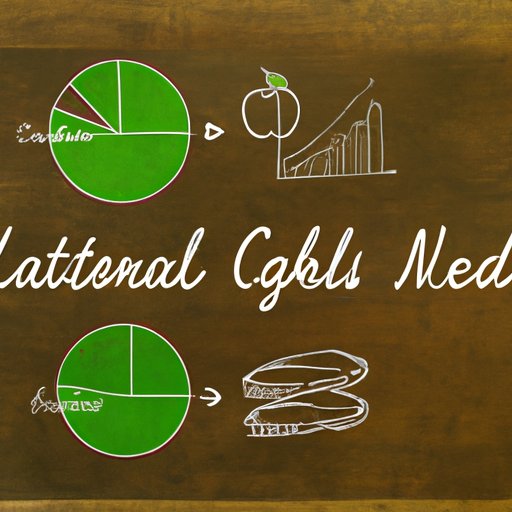
Introduction
Weight loss is a common concern among men who are keen on maintaining a healthy lifestyle. Managing calorie intake is one of the significant factors that can help men achieve their weight loss goals. However, it can be challenging to know how many calories a man should eat to reach an ideal weight. In this article, we provide information on how to determine calorie requirements and customize caloric intake based on individual needs.
Breaking it down: Understanding the caloric requirements of a man to achieve weight loss
Calories are units of energy that we obtain from the food we consume. The body uses the calories as fuel to perform daily functions such as digestion, breathing, physical activity, and cell growth. When the body consumes more calories than it burns, it stores the excess calories as fat, leading to weight gain. To lose weight, a man must create a calorie deficit by burning more calories than he consumes.
The daily caloric budget for a man to lose weight depends on various factors such as age, weight, height, and activity level. A man must consume fewer calories than his maintenance level to create a calorie deficit. The maintenance level is the total number of calories that the body needs to maintain its current weight.
Calculating calorie requirements based on individual needs is essential since the needs can vary significantly from person to person. The recommended daily calorie intake for men ranges from 2000 to 3000 calories per day, depending on the individual’s maintenance level and the desired rate of weight loss.
The science of weight loss: A comprehensive guide on caloric intake for men
Weight loss is a biological process that involves burning stored fat as energy. The body burns calories through a process called metabolism, which refers to the chemical reactions that occur within cells to create energy. The metabolism rate differs for each individual and is dependent on factors such as age, sex, muscle mass, and genetics.
The body requires a certain number of calories to maintain basic functions, such as breathing and digestion. This number is known as the basal metabolic rate (BMR). The BMR is responsible for roughly 60% to 70% of the total calories burned each day. The remainder of the calories burned can be attributed to physical activity and the thermic effect of food.
To lose weight, a man must create a calorie deficit, which means consuming fewer calories than the body burns. The body breaks down stored fat as energy when it does not have enough calories for fuel. A calorie deficit of 500 to 1000 calories per day can help a man lose 1 to 2 pounds per week.
Exercise is an excellent way to increase calorie burn and speed up weight loss. Men who engage in regular physical activity can create a calorie deficit by burning additional calories and increasing the body’s metabolism.
Men’s metabolism and calorie burn: Tailoring calorie intake for weight loss
The metabolism rate differs between men and women. Men tend to have a higher metabolism rate due to their higher muscle mass. Muscle tissue burns more calories than fat tissue, which means that men have a higher calorie burn rate.
The calorie deficit required to achieve weight loss will vary based on an individual’s metabolism rate. Men with a higher metabolism rate may need to create a more significant calorie deficit than men with a lower metabolism rate to achieve weight loss.
It is essential to note that reducing calorie intake too drastically can negatively impact metabolic rate. The body responds to prolonged calorie restriction by reducing metabolism to conserve energy. Instead, it’s crucial to customize the calorie deficit based on individual metabolic rate and establish a sustainable calorie budget.
Losing weight the healthy way: How to establish a sustainable calorie deficit
Slow and steady weight loss is the key to maintaining a healthy body weight. Rapid weight loss can be detrimental to overall health and lead to the loss of muscle mass. It’s essential to establish healthy weight loss goals and timelines based on individual needs.
To achieve sustainable weight loss, it’s crucial to develop long-term habits that promote healthy eating and regular physical activity. Tracking progress and making adjustments to calorie intake and activity level based on progress can help achieve weight loss goals.

Nutrition and weight loss: Incorporating whole foods for achieving your calorie goals
Nutrition plays a significant role in weight loss. Consuming whole, nutrient-dense foods can help create a calorie deficit while providing the body with essential vitamins and minerals. Healthy meal planning and portion control are essential strategies for successful weight loss.
Incorporating protein-rich foods such as lean meat, fish, and legumes can help increase the feeling of fullness and reduce calorie intake. Including fiber-rich foods such as fruits, vegetables, and whole grains can also promote satiety and support healthy digestion.
Tracking calories made easy: Tools and apps to help men lose weight
Tracking calorie intake can be an effective tool for weight loss. Various apps and tools can help a man monitor his calorie intake and progress. The apps use a database of foods to calculate the number of calories consumed, making it easy to track progress.
When selecting a tracking app, it’s crucial to choose one that fits individual needs and goals. Some apps offer additional features such as exercise tracking and meal planning. By tracking progress, a man can make adjustments to his diet and activity level, leading to successful weight loss.
Common mistakes while managing calorie intake for weight loss and how to avoid them
Common mistakes while managing calorie intake for weight loss include reducing calorie intake too drastically, failing to adjust calorie intake based on progress, and focusing on short-term goals. To avoid these pitfalls, it’s crucial to customize calorie intake based on individual needs and establish sustainable habits that support healthy weight loss.
Conclusion
Managing calorie intake is a vital factor for men who want to achieve weight loss. Establishing an efficient calorie budget based on individual needs can help create a calorie deficit and promote weight loss. Customizing calorie intake based on metabolic rate, establishing healthy habits, and incorporating nutrient-dense foods can support sustainable weight loss. By tracking progress and making adjustments based on progress, a man can achieve healthy weight loss and improve overall health.





